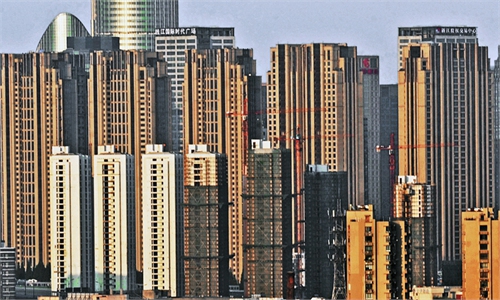China’s housing price declines slow in Dec, as policy focus remains on stability
2022 policies still focus on stability, broad easing unlikely: experts

Cranes are seen at a construction site of a housing complex in Beijing. Photo: VCG
China's real estate market remained generally stable in 2021 despite tight regulations and debt issues at developers such as Evergrande, with months-long declines in housing prices in major cities slowing in the last month of the year, prompting market expectations for policy easing in 2022.Experts said that while more policies are set to support what officials call real demand for housing, policymakers' priority to ensure stability would remain intact; therefore, housing prices are unlikely to fluctuate much and broad policy easing is out of the question.
China's real estate market has seen signs of policy support in recent weeks. For example, many banks in South China's Guangzhou cut the mortgage rate for first-time buyers from 5.85 percent to about 5.65 percent, and the rate for second-time buyers fell to 5.85 percent from above 6 percent in 2022, according the Securities Times.
Banks in Beijing and Shanghai are also issuing home loans faster.
The easier mortgage terms came after a slight correction in home prices in certain cities.
According to the National Bureau of Statistics (NBS), the prices of new commercial houses in first-tier cities rose 4.4 percent and prices of secondhand houses increased 5.3 percent on a yearly basis in December, down 0.4 and 0.5 percentage points respectively, compared with the previous month.
Housing price growth in second- and third-tier cities also slowed, the NBS data showed.
As calculated by China's property research institute Beike, the prices of secondhand houses in 70 major cities increased less than 1 percent in 2021, while prices for new homes rose less than 2 percent. Those small gains mean that 2021 was generally a year of stability.
Meanwhile, GDP growth was under greater-than-expected pressure starting from the third quarter, while repeated defaults by Evergrande also raised alarms about China's property companies.
Given the circumstances, regulators may signal further easing in the first half of 2022, experts said.
"If the housing market is weak in the first half of this year, many local governments may ease house purchasing restrictions and lower the down payment requirements," Yan Yuejin, research director at Shanghai-based E-house China R&D Institute, told the Global Times on Sunday.
Hu Qimu, chief research fellow at the Sinosteel Economic Research Institute, said that it's likely the government will ease the conditions for mortgages, so that developers won't face liquidity risks like Evergrande, while banks are likely to have higher loan quotas and process applications more quickly.
However, he stressed that the government's policy of curbing speculation won't change, so any easing moves will be made cautiously.
"The government will ensure that the housing market remains stable this year. It won't risk bubbles in this sector for any reason, not even for supporting GDP growth," Hu said.
Yan said that housing prices would follow a U-shaped trend this year, with declines in the first half and then a rebound. Both prices and transactions are likely to be flat or climb by no more than 5 percent, he said.




